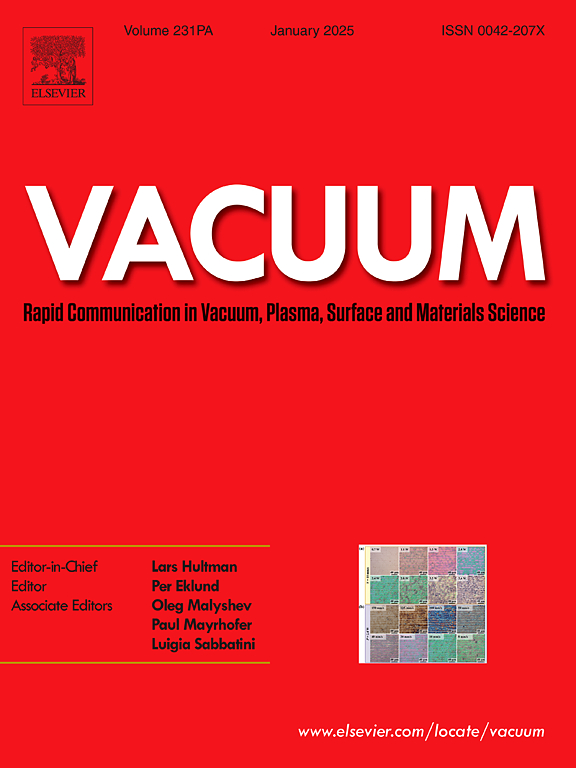Effects of translation misalignment on ion optics with slit apertures
IF 3.8
2区 材料科学
Q2 MATERIALS SCIENCE, MULTIDISCIPLINARY
引用次数: 0
Abstract
For ion thrusters, the deflection of the ion beam caused by the relative translation of the grids is one of the primary factors limiting the erosion lifetime of the ion optical system. A two-dimensional (2D) simulation package of the ion optic system is developed to investigate the ion sputtering corrosion due to grid translation misalignment. For benchmark cases, the 2D simulation package shows a reasonable consistency compared to the experimental method in ion beam deflection angle and drain-to-beam current ratio, indicating the effectiveness of the simulation package. The deviation between the simulated deflection angle and the experimental value is within 8.86%. Furthermore, this 2D package is employed to analyze the variation patterns of ion beam, ion collection, and the distribution of ion sputtering rates caused by grid translation. The simulation results indicate that the ion beam deflection occurs in the direction opposite to grid translation. The number of ions collected at different positions on the acceleration grid shows different tendencies. Only the upstream surface and the aperture surface will be subjected to energetic ion impingement. The sputtering of energetic ions on these two surfaces becomes the dominant factor limiting the grid’s ion corrosion lifetime when the grid translation is significant. The sputtering rate of energetic ions can exceed that of charge exchange (CEX) ions by more than 10 times. The proportion of the region where energetic ions contribute to sputtering expands with increasing grid misalignment, reaching up to 52.5% on surface . Additionally, the downstream surface and the aperture surface are only subjected to CEX ion sputtering regardless of grid translation. Moreover, the CEX ion sputtering regions on surfaces and expand as the grid misalignment distance increases. The peak in the ion sputtering rate distribution profile on surface becomes more prominent due to grid translation, with the sputtering rate at the peak position reaching approximately 1.65 times that of the surrounding lower-rate regions. The analysis of the electric field indicates that local electric field variations caused by grid misalignment are the underlying reason for the ion erosion characteristics.
平移错位对带有狭缝孔径的离子光学的影响
对于离子推进器来说,栅格的相对平移导致的离子束偏转是限制离子光学系统侵蚀寿命的主要因素之一。我们开发了离子光学系统的二维(2D)模拟软件包,以研究栅格平移错位引起的离子溅射腐蚀。在基准案例中,二维模拟软件包与实验方法相比,在离子束偏转角和漏极与离子束电流比方面显示出合理的一致性,表明了模拟软件包的有效性。模拟偏转角与实验值的偏差在 8.86% 以内。此外,该二维软件包还用于分析网格平移引起的离子束、离子收集和离子溅射率分布的变化规律。模拟结果表明,离子束偏转的方向与网格平移的方向相反。加速栅上不同位置收集的离子数量呈现不同的趋势。只有上游表面 Sy- 和孔径表面 Sx+ 会受到高能离子的撞击。当加速栅平移较大时,这两个表面上的高能离子溅射成为限制加速栅离子腐蚀寿命的主要因素。高能离子的溅射率可超过电荷交换(CEX)离子的溅射率 10 倍以上。高能离子溅射区域的比例随着栅格偏移的增加而扩大,在 Sx+ 表面高达 52.5%。此外,下游表面 Sy+ 和孔径表面 Sx- 只受到 CEX 离子的溅射,与网格平移无关。此外,表面 Sx- 和 Sx+ 上的 CEX 离子溅射区域随着网格错位距离的增加而扩大。由于网格平移,表面 Sy+ 上的离子溅射率分布曲线峰值变得更加突出,峰值位置的溅射率约为周围低速率区域的 1.65 倍。电场分析表明,栅格错位引起的局部电场变化是离子侵蚀特性的根本原因。
本文章由计算机程序翻译,如有差异,请以英文原文为准。
求助全文
约1分钟内获得全文
求助全文
来源期刊

Vacuum
工程技术-材料科学:综合
CiteScore
6.80
自引率
17.50%
发文量
0
审稿时长
34 days
期刊介绍:
Vacuum is an international rapid publications journal with a focus on short communication. All papers are peer-reviewed, with the review process for short communication geared towards very fast turnaround times. The journal also published full research papers, thematic issues and selected papers from leading conferences.
A report in Vacuum should represent a major advance in an area that involves a controlled environment at pressures of one atmosphere or below.
The scope of the journal includes:
1. Vacuum; original developments in vacuum pumping and instrumentation, vacuum measurement, vacuum gas dynamics, gas-surface interactions, surface treatment for UHV applications and low outgassing, vacuum melting, sintering, and vacuum metrology. Technology and solutions for large-scale facilities (e.g., particle accelerators and fusion devices). New instrumentation ( e.g., detectors and electron microscopes).
2. Plasma science; advances in PVD, CVD, plasma-assisted CVD, ion sources, deposition processes and analysis.
3. Surface science; surface engineering, surface chemistry, surface analysis, crystal growth, ion-surface interactions and etching, nanometer-scale processing, surface modification.
4. Materials science; novel functional or structural materials. Metals, ceramics, and polymers. Experiments, simulations, and modelling for understanding structure-property relationships. Thin films and coatings. Nanostructures and ion implantation.
 求助内容:
求助内容: 应助结果提醒方式:
应助结果提醒方式:


